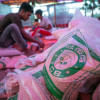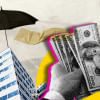Monitoring, better statistics and jawboning can check inflation

In 2022, the rising cost of consumer items is an existential threat in every country. However, each country will have to be creative and find a combination of instruments that best suits its own needs. Prof Jason Furman of Harvard University, the former chairman of President Barack Obama's Council of Economic Advisers in 2013-17, wrote last week in the Wall Street Journal, "Leo Tolstoy's observation that 'all unhappy families are unhappy in their own way' applies to the multidecade-high inflation being experienced by countries around the world. The headline inflation numbers are increasingly similar… but the causes, consequences and treatment remain quite different." (June 8, 2022)
In my last op-ed in this column, I posed a rhetorical question: How do you control inflation in a market economy? If anyone knew the answer to this challenge, they would receive the Nobel Prize in economics and/or peace. If there were a prophet who could identify the source of each inflation and offer a practical solution, many countries would embrace this person's gospel leading to peace on this Earth. Starting from Joe Biden of the US to Gotabaya Rajapaksa of Sri Lanka, many of today's world leaders would see the end of domestic unrest and the restoration of peace and tranquillity in their respective countries.
Besides price control, the measures that have attracted a lot of attention are moral suasion and jawboning. Moral suasion is an alternative to price ceilings imposed by the government. Central banks have influenced the rate of interest charged by banks through moral suasion for ages. Jawboning in economics and politics is the use of authority to persuade various entities to act in certain ways, which is sometimes underpinned by the implicit threat of future government action. Our ministers are known to frequently brandish stricter legal action against anyone involved in manipulating and inflating rice prices.
How does jawboning work in practice? Let us take the case of high gasoline prices. If the government seeks to hold the lid on prices at the pump, or the price of rice in the kitchen market, it needs to have good data on the monthly supply and demand situation in addition to the cost structure of these products. If you set the price of rice below the equilibrium, there will be an artificial shortage in the market created by wholesalers who might have paid the syndicates more than the maximum price allowed by the government. The black market price will skyrocket and lead to hunger and suffering for the masses.
Let us take the case of petroleum. In Bangladesh, the price at the pump depends heavily on the cost of crude oil in the international market. I do not have the statistics for Bangladesh, but numbers by the US Energy Information Administration indicate that the share of crude oil, refining costs, distribution and marketing, and taxes make up 58.7, 17.5, 12.1, and 11.7 percent, respectively, of the price of a gallon. If the goal is to lower the price of gasoline at the petrol pump, we need accurate information on the cost of import, refining and distribution, as well as tax. In many countries, tax on petrol is 20 percent. If the government can release any fuel in reserve or lower the tax rate, there will be a temporary relief. However, petrol pumps must be jawboned to pass on the lower costs to the consumers.
In the current round of global inflation, official figures show that nearly 80 percent inflation occur in three sectors: transport (mostly oil, plus second-hand vehicles); food (especially wheat and cooking oil); and housing (rising construction costs and rents). An average Bangladeshi family's food budget is reliant on the following consumer items: rice (coarse), wheat, masoor dal, moong dal, potato, sugar, mustard oil, soybean oil, onion, ginger, garlic, and some meat.
For the next few months, Bangladesh can use a mix of timely imports, supply management; temporary tax relief, cuts in tariffs and taxes, increase in the allocation for subsidies, widening the scope and coverage of the social safety net programmes, public procurement, and distribution programmes to offer the middle- and lower-middle-income groups a temporary respite. In addition, it can take steps to discourage import of some luxury goods and lessen demand for demerit goods, make some goods cheaper (e.g. to make sure housing is affordable), and stabilise prices (e.g. prevent rapid fluctuations in the prices of food).
Various market monitoring teams that have been formed under the food ministry need to gather price updates from major wholesale rice markets in Dhaka every day, along with comparing these prices. For some time, there has been considerable focus on the role of syndicates. However, there is inadequate data to indicate at which level of the supply chain these oligopolies exert the control that creates temporary shortages and price spikes. There are a few dozen trading houses in Bangladesh who have the capability to import in bulk (edible oil, sugar, wheat, pulses) and the financial capacity to hold on to the stocks in order to influence prices.
So, what is the moral of the story? In a letter to a political ally in 1900, Theodore Roosevelt coined the phrase, "Speak softly and carry a big stick; you will go far." The corollary was that, without a big stick and preparedness to use it, one would go nowhere, insofar as price control is concerned.
Dr Abdullah Shibli is an economist and works for Change Healthcare, Inc, an information technology company. He also serves as senior research fellow at the US-based International Sustainable Development Institute (ISDI).

 For all latest news, follow The Daily Star's Google News channel.
For all latest news, follow The Daily Star's Google News channel. 









Comments